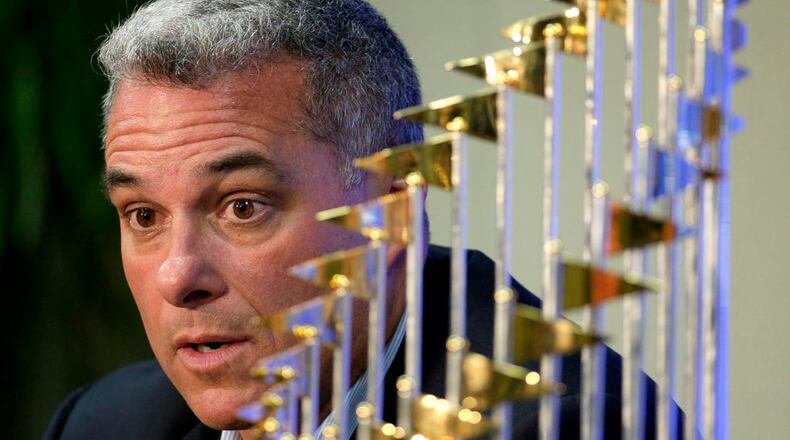A million problems in need of solutions and potential problems in need of prevention tug at Dayton Moore as he marches into a small room on the fourth floor of Kauffman Stadium.
Being the general manager of a Major League Baseball team is more setup than show, more prep work than performance. The overwhelming majority of his work is spent a few levels below what fans see in person or on TV every night, so the lead baseball executive of the defending World Series champions sits down to watch an injured pitcher throw a simulated game.
He is transfixed. In a week packed with grim news, this is one for the good guys.
"You can tell by his delivery," Moore said. "He looks great."
Moore took this job with the Royals 10 years ago this week, and he could not have known he would eventually become the most successful general manager in the franchise's proud history _ the architect of one of the great turnarounds in modern professional sports.
Moore's worldview of cause over self will prevent him from accepting the above paragraph, and his maniacal obsession with only what is in front of him won't allow for him to care much about it either way.
"The most important thing to me is we set out to revive a fan base," Moore said. "It was obvious to me immediately coming here that we'd lost a generation of Royals fans. Seeing that change, truthfully, that's been the most meaningful part of it for me."
It is impossible to overstate the changes since Moore went against the advice of friends and took one of the worst jobs in professional sports. We don't need to rehash how awful the Royals were when he arrived, but it's worth noting that Moore felt the very future of big-league baseball in Kansas City could be on the line.
In Moore's 10 years, the Royals have planned and opened a major stadium renovation, developed and traded away a Cy Young winner, have been host to an All-Star Game, nearly doubled attendance, and played what is generally viewed as the franchise's most disappointing (2009) and greatest (2015) seasons in its history.
The Royals have played 1,650 games, including 31 in the postseason, and created a lifetime of memories for a generation of fans whose parents will never forget Buddy Bell saying it can always get worse.
Moore has been defiant and humble, feisty and conciliatory, hopeful and discouraged, and both laughed and cried in this stadium. His kids have grown up here. He has been the general manager long enough for seven hitting coaches, seven opening day starting pitchers and two contract extensions for Alex Gordon. He's likely spoken to more groups of Kansas Citians than anyone other than the mayor.
One of the images Moore remembers from his first year on the job is a father and son walking into Kauffman Stadium, dad in a Royals hat and powder blue shirt, son in a Red Sox jersey with Dustin Pedroia's name on the back. Now, he sees the stadium packed, the streets around town full of people with blue shirts and jerseys.
This is what he's proud of, even more than the flags and rings. Some people will read that and not understand, or be frustrated, and there was a time that would've bugged Moore. The backlash to his comments about feeling like he'd won the World Series in 2013 infuriated him. But it's different now.
He knows what he means, and maybe now that the city is full of love for baseball again, more fans do too.
"A lot of things have to go your way to win a championship," he says. "But I think we can always have a product on the field, a team on the field, and a group that understands the importance of connecting with the community. A group that cares about winning, and winning for one another. You can always have a very good baseball environment."
This gets Moore to thinking. He's had friends who've wanted out of organizations 10 days after winning the World Series. He's always worked hard to prevent that here, to make the culture something that everyone from Eric Hosmer to the upper-deck ushers want to be part of.
This reminds him of Oct. 16, 2014. He knows the date off the top of his head. The day after the Royals beat the Orioles to advance to the World Series. Moore rarely speaks to the players as a group. He saves that for coaching changes, or spring training introductions. But he did it that day.
"I'm more proud that you've revived baseball in Kansas City," he remembers telling them. "You've done it the right way. You've connected with our fans, and you've ensured the game of baseball will be revered in this community. You have paved the way for future players to sit in your locker in the future at Kauffman Stadium."
This is the contradiction of Moore, one that's grown with him in his decade on this job. He was called a micromanager by some in the organization his first few years here, but has always focused on giving away power. He knows the baseball twitches and blind spots of his players and scouts, but will spend hours talking to them about their families.
He is obsessed with every minute detail that goes into each baseball game, but over his time here has put more thought and energy into the bigger world.
Maybe that's a growing appreciation for how principles he values in baseball can work in other fields. For whatever reason, even when he was a kid, he's always been convinced that teams can't be their best unless the shortstop enjoys watching the first baseman succeed, and the first baseman likes watching the catcher succeed, and so on. The only way to have a good team is to have a lot of good teammates.
That's one thing that made him fall in love with baseball, come to think of it. The sport demands that you manage failure well, and it can root out selfishness.
This swelling recognition of how baseball fits in the bigger world is the driving force behind Moore's work with the Urban Youth Academy. He's given his time and money to the cause, and been gratified on several levels that players such as Sal Perez, Alex Gordon, Eric Hosmer, Mike Moustakas and Chris Young have done the same.
There is a natural question here, then. Moore has achieved the ultimate goal in his profession of choice. What could ever match leading the Royals from the worst in baseball to world champions? But he's only 49, far too young to retire, and he is hooked on his sport.
The interview for this column is not the first time he's been asked if he could picture backing away from the daily grind _ sort of like how his mentor, John Schuerholz, did in becoming club president in Atlanta _ while maintaining an influence and creating more time to devote to the Urban Youth Academy.
Moore is not to the point where he's making plans like that, but the topic does prompt him to reflect a little.
"It's important for our legacy here that we continue to respect the game, and that our fans enjoy, or escape whatever they need to escape from, with the game of baseball," he says. "Baseball is really, really hard. No different from your job, or anyone else's. There's enough challenges for all of us, each and every day, to keep us stimulated and occupied, with tremendous opportunity for growth if we dive into it and do it the right way."
There's a pause.
"I don't know what I would do (after this job)," he says. "I mean, I'm sure there will come a point in time. But, I don't know."
By now, rain has washed the stadium and the field in front of him, cutting short that simulated game. Moore's cellphone has been buzzing. There are more problems that need solutions, more potential problems that need prevention.
About the Author
Keep Reading
The Latest
Featured


